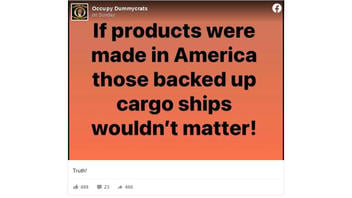
If products were made in the United States, would the U.S. cargo ship backlog -- spurred in part by the COVID-19 pandemic -- be inconsequential? No, that's not true: Not only does the U.S. produce its fair share of products, but trade is vital to the country's economy.
The claim appeared in a Facebook post (archived here) on October 10, 2021, by the political satire page Occupy Dummycrats. The graphic included in the post reads:
If products were made in America, those backed up cargo ships wouldn't matter!
This is what the post looked like on Facebook on October 13, 2021:
(Source: Facebook screenshot taken on Wed Oct 13 22:36:32 2021 UTC)
While the dollar amount of U.S. imports is higher than that of exports, the post's premise that products are not made in the U.S. is not true. According to the U.S. Census Bureau, manufacturing is the country's fifth-largest employment sector with 12.1 million workers who produce goods for use domestically and for exportation. The U.S. is also the world's second-largest exporter of goods.
The cargo ship backlog does not only concern finished products. Materials used to manufacture products are imported into the country as well. Such movement is part of logistics, which is an important consideration in a supply chain. In remarks delivered by President Joe Biden on October 13, 2021, concerning the country's supply chain issue, he explained:
Supply chains essentially mean how we make things and how the material and parts get delivered to factory -- a factory -- so we can manufacture things and manufacture them here. How we move things: how a finished product moves from a factory, to a store, to your home.
To Biden's point, the U.S. imports raw materials. For example, a U.S. International Trade in Goods and Services report published by the U.S. Census Bureau stated that during August 2021, the U.S. imported $3.93 billion in crude materials -- not including fuels -- such as crude rubber and pulp and waste paper.
In an email to Lead Stories on October 13, 2021, Phillip Sanfield, director of media relations for the Port of Los Angeles, North America's busiest container port, directed us to information about the port's top containerized imports and exports of 2020. Among the port's top containerized imports were products that tend to be used in conjunction with others: auto parts and plastics were the second and fifth imports, respectively. Similarly, the port's top containerized exports included scrap metal and fabric/raw cotton, which were the fourth and fifth exports, respectively. Such information affirms that trade consists of far more than finished products.
Lead Stories reached out to organizations including the American Association of Port Authorities and the National Retail Federation, along with several U.S. government agencies such as the U.S. Department of Commerce, for comment. We will update this story with any relevant responses.
Lead Stories has previously debunked information about the cargo ship backlog brought on by the effects of the COVID-19 pandemic, which can be found here and here.


















